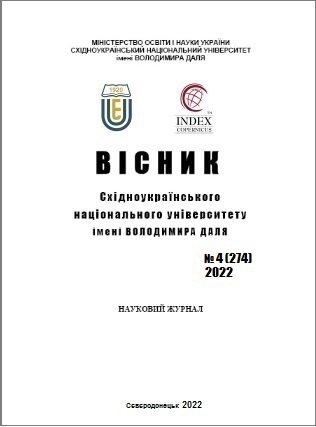Сontrolling measures for the company’s sustainable development strategy implementation
DOI:
https://doi.org/10.33216/1998-7927-2022-274-4-20-24Keywords:
strategic management, innovative activity, budgeting, tactics, policy, proceduresAbstract
Innovative activity contributes to the achievement of dynamic and static stability of industrial enterprise development. Strategic planning in the field of innovation is the main element of sustainable development, increasing the competitiveness and efficiency of the enterprise in market conditions. In our opinion, the concept of "sustainable development" should include not only a dynamic, but also a static component (according to one of the proposed principles). Basically, sustainable development is perceived as development that allows obtaining various benefits (ecological, economic, social, prospective) both in the present and in the future; that is, a kind of system that is constantly replenished. We certainly agree with this approach. However, the second (static) component is often not taken into account, which is an unacceptable oversight, since not only the principle of reproduction is important in sustainable development, but also the principle of balanced development of the enterprise as a system, that is, the principle of balanced development of its elements. In the modern conditions of economic development, there are many effective ways and methods of forming development strategies: analytical, research-experimental, forecasting methods, economic, social-psychological, administrative, etc. The most promising methods, in our opinion, are portfolio methods (based on the construction of matrices), intuitive methods (especially relevant in conditions of lack of information), program-target methods and methods of mathematical modeling. As noted, the sustainable development of an industrial enterprise on an innovative basis is achieved by balancing the state of the ecological, social and economic system in the present and its development in the future. Therefore, the company should conduct an adapted SWOT analysis in view of these areas. The process of monitoring the implementation of the company's sustainable development strategy consists of three main stages: evaluation of the company's work; comparing the quality of his work with existing standards; corrective processes invested in ensuring the implementation of the intended. It should not be forgotten that the listed stages are the most general components of the entire process of organizational control. More specific types of organizational control (for example, output control, inventory control, strategy implementation control, and quality control) are based on these stages, but they have correspondingly more specific requirements.
References
1. Grinyova V. M., Vlasenko V. V. (2005), Organizational problems of innovative activity at the enterprise: monograph Kharkiv: INZHEK, 2005, 200 p.
2. Ilyashenko S. M. (2010), Innovative management: a textbook. Sums: University Book. 334 p.
3. Stadnik V. V, Yokhna M. A. (2006), Innovative management: a textbook. Kiev: Academic, 464 p.
4. Petukhova O. M. (2012), Formation of enterprise innovation management system. Science. Labor Nat. un-food. Technologies, № 43, P. 174–180.
5. Kozlovsky V. A. (2007), Innovative management: textbook. tool. Vinnytsia: VNTU, 210 p.
6. Klius Y. I. (2015) Organizacijno-informacijne formuvannya korporativnogo upravlinnya innovaciyami. Globalni ta nacionalni problemi ekonomiki. no 6. –– [Elektronne naukove vidannya]. –– Rezhim dostupu: http://global-national.in.ua/issue-6.

